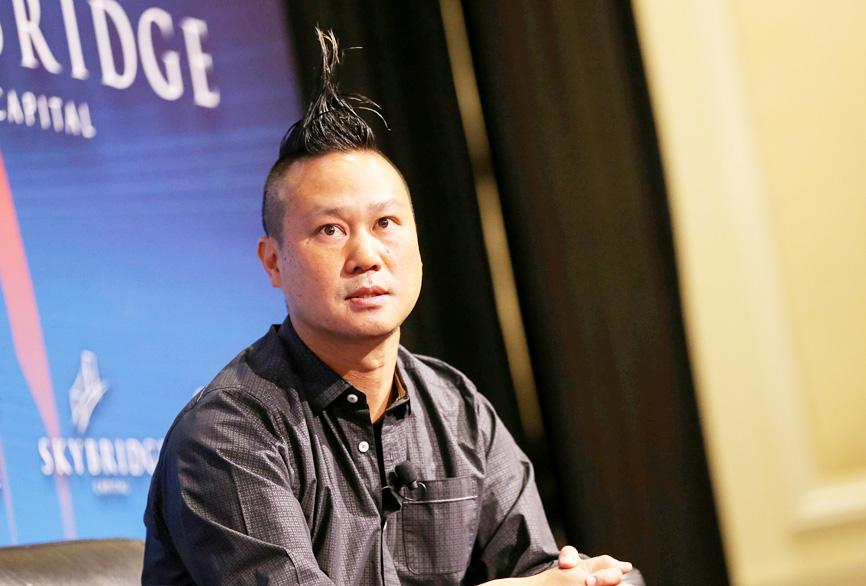Tony Hsieh (謝家華), the retired chief executive of Zappos.com who revolutionized the online shoe industry and gained notoriety for his company’s unique corporate culture, has died. He was 46.
Puoy Premsrirut, a lawyer for the Taiwanese-American Hsieh, told news outlets that Hsieh had been injured in a house fire while visiting Connecticut.
He was with family there when he died on Friday night, KLAS-TV reported.

Photo: Reuters
A Nov. 18 house fire in which Hsieh is believed to have been injured remains under investigation, according to the Hartford Courant, which cited the New London fire chief and reported the home that burned is owned by a long-time Zappos employee.
A Harvard graduate, Hsieh gained success in the dot com era. He joined Zappos in 1999 when it was called ShoeSite.com and led it for two decades.
Amazon.com Inc purchased the company for US$1.2 billion in 2009 and Hsieh remained as chief executive until stepping down in August.
Amazon’s purchase of the firm signaled CEO Jeff Bezos was both impressed and threatened by Zappos’ fast delivery of online orders and customer service reputation.
Hsieh’s success selling shoes online stood out because it was a product people traditionally like to feel on their feet before buying.
“The world lost you way too soon,” Bezos wrote on Saturday on Instagram. “Your curiosity, vision, and relentless focus on customers leave an indelible mark.”
Hsieh was a fixture in the tech speaker circuit and espoused his company’s commitment to “holocracy,” a decentralized management style where decisionmaking was spread throughout the organization without traditional hierarchy.
He stood out as a non-traditionalist even in an industry known for breaking tradition.
He lived in a trailer park in downtown Las Vegas that attracted creative people working on the strip. They would eat communal meals by a big fire pit and a pet alpaca roamed the park.
Hsieh would make random appearances in the park to play a card game with visitors that forced them to pick priorities in their lives.
Tributes swirled on social media from the tech industry, Las Vegas — where the company was headquartered — and from US President Donald Trump’s daughter Ivanka.
Nevada Governor Steve Sisolak thanked him for helping transform the city, while Ivanka Trump said Hsieh’s originality challenged her to “reject conformity.”

TAKING STOCK: A Taiwanese cookware firm in Vietnam urged customers to assess inventory or place orders early so shipments can reach the US while tariffs are paused Taiwanese businesses in Vietnam are exploring alternatives after the White House imposed a 46 percent import duty on Vietnamese goods, following US President Donald Trump’s announcement of “reciprocal” tariffs on the US’ trading partners. Lo Shih-liang (羅世良), chairman of Brico Industry Co (裕茂工業), a Taiwanese company that manufactures cast iron cookware and stove components in Vietnam, said that more than 40 percent of his business was tied to the US market, describing the constant US policy shifts as an emotional roller coaster. “I work during the day and stay up all night watching the news. I’ve been following US news until 3am

Six years ago, LVMH’s billionaire CEO Bernard Arnault and US President Donald Trump cut the blue ribbon on a factory in rural Texas that would make designer handbags for Louis Vuitton, one of the world’s best-known luxury brands. However, since the high-profile opening, the factory has faced a host of problems limiting production, 11 former Louis Vuitton employees said. The site has consistently ranked among the worst-performing for Louis Vuitton globally, “significantly” underperforming other facilities, said three former Louis Vuitton workers and a senior industry source, who cited internal rankings shared with staff. The plant’s problems — which have not

TARIFF CONCERNS: The chipmaker cited global uncertainty from US tariffs and a weakening economic outlook, but said its Singapore expansion remains on track Vanguard International Semiconductor Corp (世界先進), a foundry service provider specializing in producing power management and display driver chips, yesterday withdrew its full-year revenue projection of moderate growth for this year, as escalating US tariff tensions raised uncertainty and concern about a potential economic recession. The Hsinchu-based chipmaker in February said revenues this year would grow mildly from last year based on improving supply chain inventory levels and market demand. At the time, it also anticipated gradual quarter revenue growth. However, the US’ sweeping tariff policy has upended the industry’s supply chains and weakened economic prospects for the world economy, it said. “Now

UNCERTAINTY: Innolux activated a stringent supply chain management mechanism, as it did during the COVID-19 pandemic, to ensure optimal inventory levels for customers Flat-panel display makers AUO Corp (友達) and Innolux Corp (群創) yesterday said that about 12 to 20 percent of their display business is at risk of potential US tariffs and that they would relocate production or shipment destinations to mitigate the levies’ effects. US tariffs would have a direct impact of US$200 million on AUO’s revenue, company chairman Paul Peng (彭雙浪) told reporters on the sidelines of the Touch Taiwan trade show in Taipei yesterday. That would make up about 12 percent of the company’s overall revenue. To cope with the tariff uncertainty, AUO plans to allocate its production to manufacturing facilities in